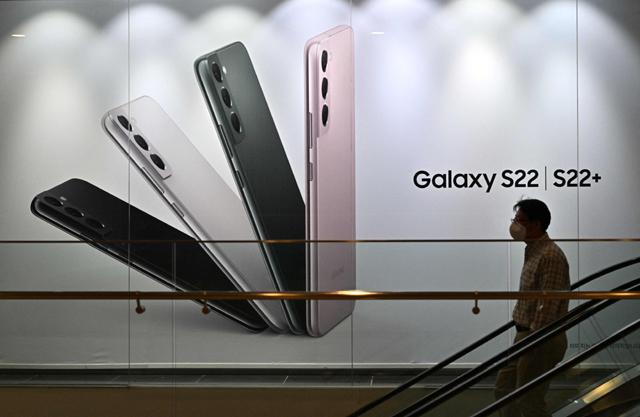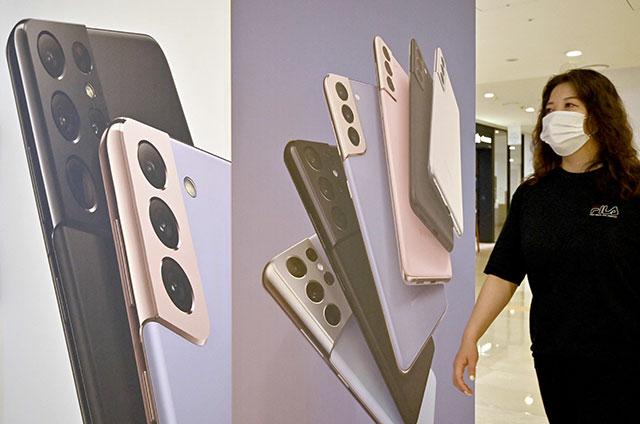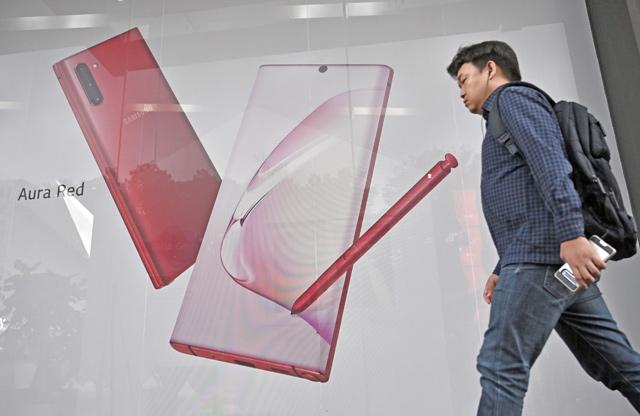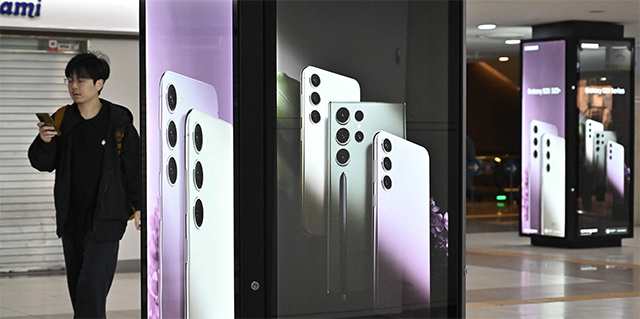You are here
Samsung Electronics Q1 net profit up almost 60%
By AFP - Apr 28,2022 - Last updated at Apr 28,2022

A man walks past an advertisement for the Samsung Galaxy S22 smartphone at the company's Seocho building in Seoul, on Thursday (AFP photo)
SEOUL — South Korean tech company, Samsung Electronics, posted a near 60 per cent rise in first-quarter net profit on Thursday, largely driven by steady memory chip demand and brisk smartphone sales.
The world's biggest memory-chip maker is the flagship subsidiary of the giant Samsung group, by far the largest of the family-controlled empires known as chaebols that dominate business in South Korea, Asia's fourth largest economy.
The conglomerate is crucial to the South's economic health — its overall turnover is equivalent to a fifth of the national gross domestic product.
The firm said net profit in January-March was 11.32 trillion won ($8.9 billion) — up 58.6 per cent on-year, beating expectations, according to Bloomberg News.
The tech industry has been hit hard by a shortage of components for chipmaking, blamed on a boom in global demand for electronic products and disruption to supply chains caused by the pandemic.
But analysts say this has largely been benefitting Samsung.
Last year saw a surge in chip prices thanks to strong demand for those used in personal devices and data centres, helping the firm hit record annual sales.
Samsung's performance "continues to be lifted by the semiconductor segment, supported by memory chip — both DRAM and NAND — demand from data centres", said Gloria Tsuen, vice president of Moody's Investors Service.
Tsuen added that a disruption at a rival NAND flash chip plant — owned by American firm Western Digital and Japan's Kioxia — has also benefited Samsung "due to reduced market supply".
The firm's operating profit rose 50.5 per cent to 14.12 trillion won, while revenue was also up 19 per cent at 77.78 trillion won.
Keeping capacity high
Samsung Electronics said it had "posted a record consolidated revenue for the third straight quarter".
Samsung shares closed down 0.3 per cent in Seoul on Thursday.
Samsung has aggressively stepped up investment in its semiconductor business as the world battles chip shortages.
In November, it announced the building of a $17 billion microchip factory in Texas, which is expected to be operational by the end of 2024.
The firm is also investing in the development of advanced technologies such as artificial intelligence, robotics and 5G/6G communications.
"Memory chip makers generally need to keep capacity high to support technology migration," Tsuen said.
"Samsung is also in the foundry segment, and the new fab in Texas is an example of increased investment in that area as well," she said, referring to a semiconductor fabrication plant.
Samsung Electronics said its "memory business achieved a record-high in quarterly sales for servers amid solid demand".
In smartphones, the firm's new flagship lineup — the Galaxy S22 series — sold 60 per cent more than the S21 in its first three weeks in the United States, according to research firm Counterpoint.
"Strong sales of the Galaxy S22 series since its launch in Q1 helped drive the revenue growth, on the back of Galaxy S22 Ultra with S-Pen garnering positive feedback from the existing Galaxy Note customers," Samsung said in a statement.
More than half of the Galaxy S22 series sold in the first quarter were the flagship S22 Ultra models — released after the Galaxy Note was discontinued, Sujeong Lim, a Counterpoint researcher, said.
"The Galaxy Note is a model series with higher level of customer loyalty among Samsung's models, and the S22 Ultra was able to respond to the waiting demand of these customers," Lim said.
"The price freeze, recovery from COVID, and the fact that it is the first Galaxy smartphone to be equipped with a 4nm processor appealed to customers."
But the firm is not without any challenges, analysts said.
Its "strong performance of semiconductors stems largely from external factors" such as the pandemic, Lim said.
"Considering inflation, the rise in interest rates and changes in consumption patterns post-COVID, it is difficult to bet that DRAM demand growth will continue through next year."
But despite other major risks in the macro environment — Russia's invasion of Ukraine and the COVID-19 lockdown in Shanghai — Tsuen said Samsung's credit profile is likely to "remain very strong".
The firm is supported by "its large net cash and leading market positions in key products", she said.
South Korea's second largest electronics maker LG Electronics said on Thursday that its first-quarter net profit rose 19.8 per cent on-year to 1.4 trillion won.
Related Articles
SEOUL — Samsung Electronics' net profits surged more than 70 per cent in the second quarter thanks to higher memory chip prices fuelled by p
SEOUL — Samsung Electronics said on Tuesday it expected operating profit to drop more than 50 per cent in the third quarter as it struggles
SEOUL — Samsung Electronics on Thursday reported its worst quarterly profits in 14 years, blaming slowing consumer spending on electronics a



















